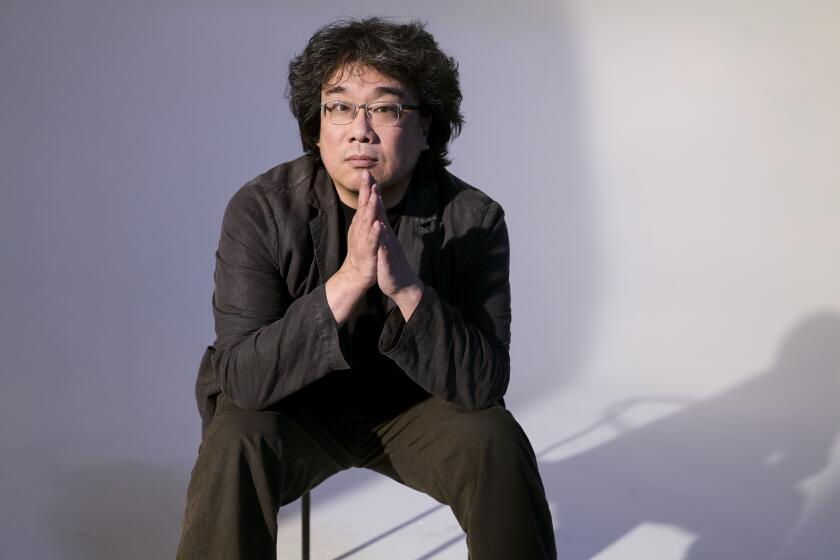Docufantasy Explores Life of a Loving Grandma
- Share via
Jan Oxenburg’s “Thank You and Goodnight!” which screens Tuesday at 8 p.m. at UCLA’s Melnitz Theater as part of a series presented by the UCLA Film Archive and Independent Feature Project/West, is a quirky, quite affecting memoir.
Oxenburg attempts to come to terms with the impending loss of her grandmother, Mae Joffe, from cancer in what the filmmaker aptly calls a “docufantasy.” She intercuts footage of her grandmother and other members of her family with sequences in which she represents herself as a small child with a cutout figure (sometimes her grandmother is similarly represented).
The film is a way for Oxenburg to make up for her neglect--once she had grown up and moved away--of her grandmother who had provided her with so much love and attention when she was a child.
But Joffe is no more complaining of this neglect than she is of the illness she accepts as terminal; she cooperates with her granddaughter up to her final hours, out of her pride in Oxenburg and perhaps also gratitude at being paid attention at last.
This delightful, even jaunty film, cuts through surface behavior and emotions to tap the love that connects family members to each other more than they may realize. Information: (213) 206-FILM, 206-8013.
A Tale of Drifters: Mehdi Charef’s “Tea in the Harem,” which had a brief local run in 1986, launches USC’s “The Foreigner” series Thursday at 7 p.m. in Room 202 of USC’s Taper Hall of Humanities. It’s a superbly evoked classic coming-of-age tale in which Charef takes the broadest, most detached perspective in telling of a pair of young drifters.
Pat (Remi Martin) and his best friend, Madjid (Kader Boukhanef), an Algerian immigrant, live with their families in the vast, stark Gennevilliers housing project on the outskirts of Paris and get by as petty thieves. Charef, who grew up in Gennevilliers himself, depicts the racism that conspires to defeat Madjid and the lack of rewarding job opportunities facing both youths.
However, Charef is thankfully an artist before he is a social critic, which means that his semi-autobiographical story is truly universal: Madjid and Pat obviously have their counterparts in every major city in the world, young men without skills who realize they face futures as bleak as their surroundings and are tempted by a life of crime.
Unlike Pat, who has a long reverie in which he dreams of success as a Cannes gigolo, Madjid has an inkling that he’s got to take responsibility for himself and try to make something of his life despite the odds.
One of the great strengths of this gritty yet beautiful film is that Charef does no special pleading; in fact, neither Madjid nor Pat are what you would call nice guys, although they do possess the capacity for caring for others. The meaning of the film’s curious title is revealed in a flashback: one of Madjid and Pat’s Algerian classmates garbles the Theorem of Archimedes as “tea in the harem of Archi Ahmed.” For complete schedule and further information: (213) 740-2666.
Italian Splendor: “Classics of the Italian Silent Cinema” continues Saturday at 8 p.m. in LACMA’s Bing Theater with some more delightful shorts featuring such beloved comedians as Cretinetti and Polidor; an hourlong melodrama, “Assunta Spina” (1915), starring Francesca Bertini; a short with Bertini as Salome, and, as the main feature, Mario Camerini’s giddy, hilarious “I Want to Be Unfaithful to My Husband” (1925).
A sophisticated marital farce in elegant settings, the featured film stars lovely Linda Pini as a flirtatious countess who mistakenly assumes her count (Alberto Collo) has been unfaithful. In truth, he would have been, had not fate amusingly intervened, just as it does when the countess attempts to get even. Camerini (1895-1981) had a 50-year career, hitting his stride in the ‘30s, when he launched Vittorio De Sica to stardom.
In 1976, Bernardo Bertolucci lured Francesca Bertini, a legendary early screen beauty, out of long retirement for a small role in “1900.” “Assunta Spina” is a dated potboiler about jealous suitors and noble self-sacrifice, but Bertini, who has a majestic screen presence, is able to suggest that beauty can be a curse. Anneliese Varaldiev will provide simultaneous live translation of the intertitles; Robert Israel will accompany the films on the Allan organ. Information: (213) 857-6010.
More to Read
Only good movies
Get the Indie Focus newsletter, Mark Olsen's weekly guide to the world of cinema.
You may occasionally receive promotional content from the Los Angeles Times.










